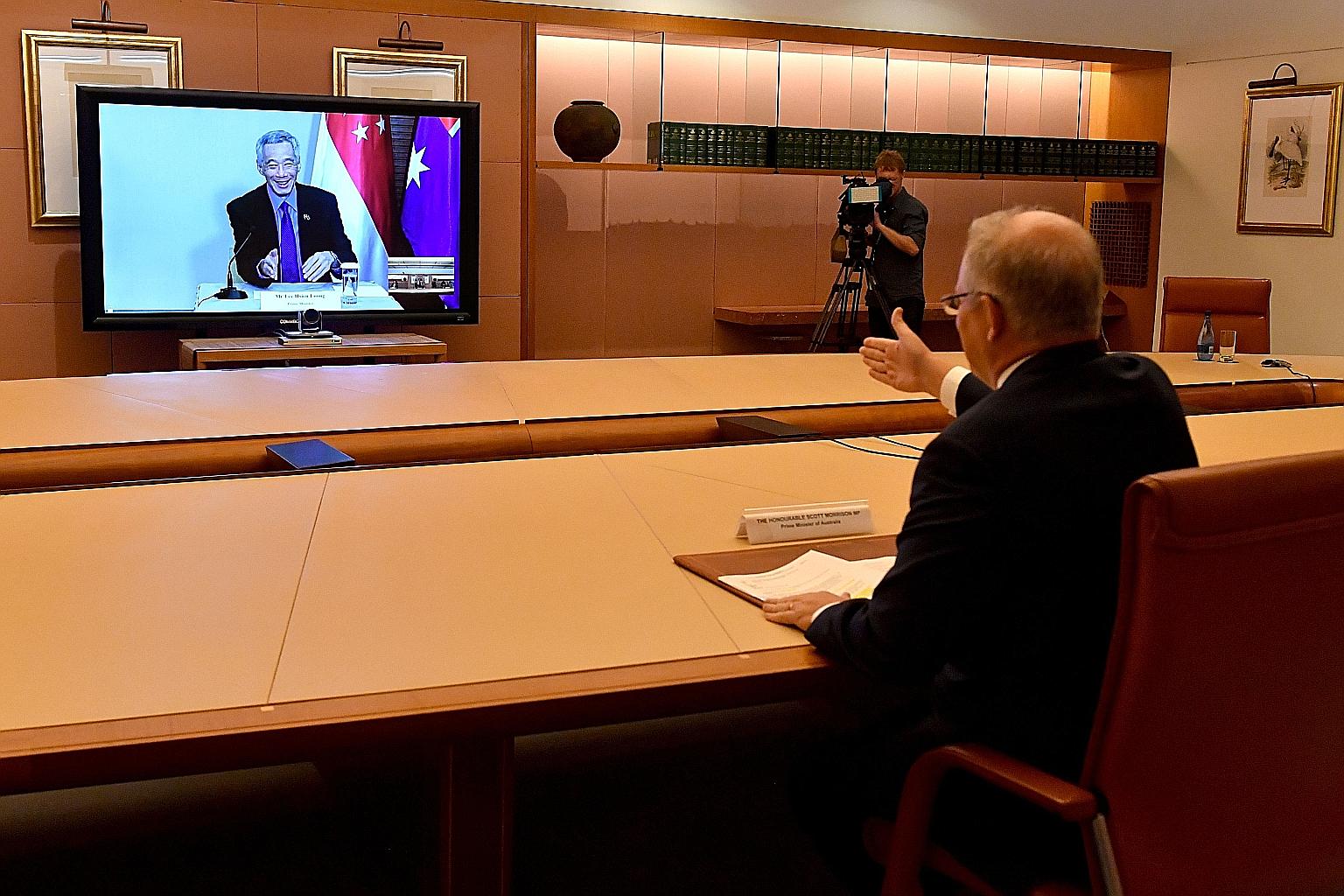Singapore and Australia deepen bilateral ties with raft of new agreements
Both countries' prime ministers meet via video conferencing due to coronavirus situation
Sign up now: Get ST's newsletters delivered to your inbox

Singapore's Prime Minister Lee Hsien Loong and Australia's Prime Minister Scott Morrison holding their hands out for a virtual handshake during their video conference yesterday.
PHOTO: AGENCE FRANCE-PRESSE
Singapore and Australia yesterday inked a digital economy pact that aims to set a benchmark for international trade rules in a digital world, and 10 agreements to boost bilateral cooperation at a time when both countries are grappling with the coronavirus pandemic.
This Digital Economy Agreement (DEA) will create a framework for both countries to cooperate more closely in areas such as digital identities and e-payments, so as to shape international rules and address issues arising from these emerging technologies.
Prime Minister Lee Hsien Loong and his Australian counterpart Scott Morrison witnessed the signing of three of the agreements after they met via video conferencing, in lieu of a face-to-face meeting in Canberra, because of the coronavirus situation.
During the meeting, both leaders reaffirmed the excellent bilateral ties, and said good progress has been made in a range of areas of cooperation since the two countries signed a Comprehensive Strategic Partnership (CSP) in 2015.
The video conference "shows that in this digital age, government-to-government business can continue despite the adverse circumstances, and also demonstrates our commitment to advance our bilateral cooperation even as we deal with the pandemic", said Mr Lee.
One of the agreements signed upgraded a memorandum of understanding (MOU) on military training area development to a treaty.
It will create a vastly larger area in Queensland for the Singapore Armed Forces to carry out longer, more mechanised and integrated training across its three services.
The other two MOUs signed will see both countries deepen cooperation on artificial intelligence (AI) and data innovation. Seven other deals dealing with areas such as cyber security, e-invoicing and food safety were pre-signed.
Minister for Communications and Information S. Iswaran, who signed the two MOUs under the DEA, said the agreements will help establish interoperability between digital systems and promote cross-border data innovation. They will also encourage trusted, safe and responsible development and use of AI technologies, by setting standards with ethical requirements.
"As we deal with the global Covid-19 situation, digital ways of interacting are becoming ever more important and salient," Mr Iswaran wrote on Facebook yesterday. "New ways of doing business across borders such as e-commerce, cross-border data flows, and even announcing and signing today's DEA and MOUs 'digitally' are not just good to have, but also essential."
The DEA will also see agencies on both sides jointly support the commercialisation of digital technologies, such as through pilot projects.
For instance, Singaporeans may eventually be able to use their digital identity to open a bank account or apply for a visa to Australia, said officials.
Another sector set to benefit from the DEA is financial services, as the pact prohibits data localisation requirements - that data be stored and processed within a country's borders - which the Monetary Authority of Singapore (MAS) called "an unnecessary barrier to trade (that) can drive up the cost of storing data for all businesses".
"(The agreement) will ensure that financial institutions in Singapore and Australia can move financial data across the two jurisdictions to support their risk and business decisions," said MAS managing director Ravi Menon.
In a sign of strong and growing ties, Mr Lee and Mr Morrison agreed there was potential to collaborate in new areas such as low-emissions solutions, and that an MOU for this would be signed this year.
Mr Lee said Singapore-Australia relations have made substantial progress in the five years since the signing of the CSP agreement, and that he looked forward to deeper cooperation on longer-term issues like sustainability and climate change. "I know these are very much on Australians' minds, as they are on ours," he added.
Mr Morrison said: "While we might be isolated in distance, our partnership is as strong as ever and more important now than I considered at any other time."


